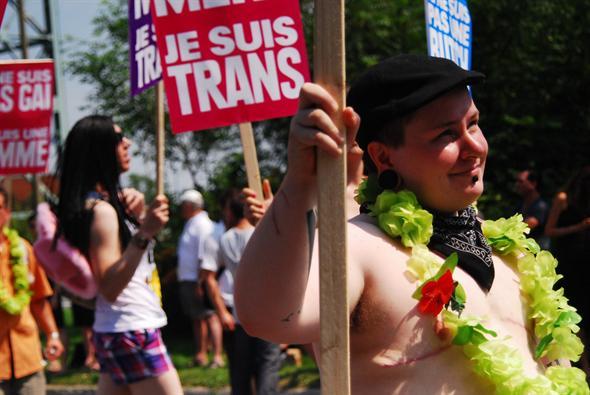It’s still a young buck, but Célébrations de la fierté Montréal is ready to shake its booty to a growing crowd this weekend. Yet as the parade travels down René-Lévesque Blvd on Sunday, Montreal Pride will be making a return to grassroots activism with the support of an entirely different festival.
For clarity, let’s sum up the Montreal Pride confusion of recent years: Divers/Cité, the original founder and organizer, placed its Community Day and parade back into the hands of the community in 2007 and dropped it from its schedule. Faced with the prospect of having no parade, Montreal queers quickly formed Célébrations de la fierté.
Divers/Cité’s decision offered Pride the chance to return to more activist and community roots, at a time when Divers/Cité’s parade (not unlike parades in Canada’s biggest cities) was scrutinized for getting too commercial. The jury’s still out on how politically “active” Célébrations will remain, but a third festival called Pervers/Cité has also grown in size to put the politics back into Pride. Considered the “Underside of Pride,” Pervers/Cité is organized by individual activists and alternative groups throughout the city, and to date, it’s been self-sufficient as a platform for events by those more radical queers.
“Célébrations started in the village with a lot of ties to that area,” says P/C co-founder and committee member Josh Pavan. “Pervers/Cité started in those scenes that weren’t in the village, like in Mile-End or Hochelaga-Maisonneuve. It was important to foreground the more marginalized experiences within the queer community, and we’ve always felt that the parade dates were important, so we’ve always aligned ourselves with those.”
Pavan and his team have cleverly kicked off Pervers/Cité as a 10-day fest that connects the dates between Divers/Cité and Pride. So as Célébrations kicks off pre-events — its Saturday Community Day and the parade on Sunday — Pervers/Cité is already busy this weekend hosting workshops, a bookfair and a queer metal night called “Balls to the Wall.”
Apart from the Harper government’s decision not to give federal tourism funding for any Canadian Pride events, this summer’s major Pride controversy revolved around the group Queers Against Israeli Apartheid (QuAIA). As in 2009, Montreal’s QuAIA contingent is represented by the local queer collective QTeam, a major player at Pervers/Cité. Year-round, QTeam organizes lectures, panel discussions and other events.
QuAIA was almost prevented from marching in the Toronto Pride parade after organizers banned the phrase “Israeli apartheid.” Following outrage from the queer community, the ban was reversed just weeks before the parade.
Célébrations recently told the CBC that QuAIA was welcome to march, but Pride organizers suggested that they might seek to restrict QuAIA’s messaging.
“We will let them say what they have to say, but it has to be said in a peaceful … and civilized manner,” said Célébrations vice-president Jean-Sébastien Boudreault. “We are not going to tell them what to write, but we might tell them how to write it.”
Xtra contacted Célébrations for comment, but our call was not returned before publication.
“One of our main focuses,” says QTeam collective member Tara Gold, “is to have a queer presence for a multitude of struggles, politicizing queerness to understand its differences and variations. And part of what we’re doing is honouring that Montreal [political] history with an anti-corporate approach, not one that’s about ‘we can be gay-positive if you buy our stuff.'”
Having marched in the past against military recruitment and the oppressive “clean-up” of human beings during Olympic ceremonies, Gold stress the QuAIA representation by QTeam is just one of many struggles they take on, as does Pervers/Cité’s Pavan, who as we spoke was hosting an evening of “queer ballet” and a panel on HIV/AIDS disclosure and stigma.
“Pervers/Cité is rooted in social justice,” says Pavan, “and whenever you speak out on issues like QuAIA there’s a bit of a backlash, but really positive things have also come out of it, especially on the politicization and de-corporatization of Pride.”
Célébrations de la fierté and Pervers/Cité both continue until August 15: visit fiertemontrealpride.com and perverscite.org.

 Why you can trust Xtra
Why you can trust Xtra


